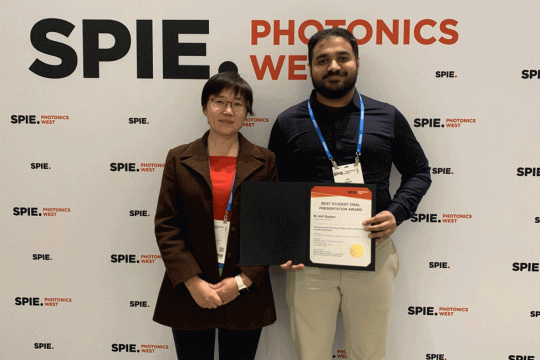RIT game design programs ranked among top in the world
Annual Princeton Review list ranks undergraduate program No. 4, graduate program No. 5
The Princeton Review ranked RIT’s undergraduate game design program fourth-best in the world.
Rochester Institute of Technology offers some of the best game design and development programs for aspiring game developers, according to new international rankings from The Princeton Review.
RIT’s game design and development program was ranked fourth at the undergraduate level and fifth at the graduate level on the 2021 list, released today. RIT jumped in the rankings from last year—from fifth and 12th respectively. RIT’s program is housed in the School of Interactive Games and Media (IGM) within the Golisano College of Computing and Information Sciences.
“This jump in placement signifies the strength of IGM leveraging its computational roots in the context of design, while building collaborations all across RIT,” said David Schwartz, director of IGM. “IGM also had a banner year in terms of student competitions and funding for faculty research and scholarship. The IGM staff has been fantastic supporting and growing all these initatives.”
The lists, which name the “Top 50” undergraduate and “Top 25” graduate schools, are posted at the Top Game Design Schools 2021 website. There, users can also get information on The Princeton Review’s methodology for this project and its detailed profiles of schools with guidance for applicants on their programs, admission requirements, and financial aid.
The Princeton Review chose the schools based on its 2020 survey of 150 institutions in the U.S., Canada, and abroad offering game design courses, majors, or degree programs. The 50-question survey collected information about the schools’ game design programs in four areas: academics, faculty, technology, and career prospects.
“The schools on our 2021 lists all offer standout programs for students considering careers in game design,” said Rob Franek, editor-in-chief for The Princeton Review, in a news release. “Their faculties are superlative. Their facilities are state-of-the-art. Their alumni include many of the video game industry’s most prominent artists, designers, developers, and entrepreneurs.”
The Princeton Review survey found that more than two-thirds of students in the top programs worked on a shipped game as part of their studies. It also found that nearly all of the students developed an actionable plan to launch a functional game after graduation.
RIT has been a pioneer in the field of video game design and development education. Game design students work with RIT’s MAGIC Center, a nonprofit university-wide research and development laboratory and commercial LLC production studio that assists in efforts to bring digital media creations up to marketplace standards and commercialization. RIT’s MAGIC Spell Studios focuses on nurturing and growing new companies and publishing and distributing their projects.
RIT’s Bachelor of Science in game design and development provides a broad-based undergraduate education in computing while exposing students to the breadth of game design and development processes. Students are required to complete coursework in the liberal arts, social sciences, and the laboratory sciences.
Students who pursue a master’s degree in game design and development at RIT focus on the technical roots in the computing and information sciences disciplines, while simultaneously covering the breadth of the development landscape through involvement in topics including computer graphics, game engines, interactive narrative, and game world design. The degree culminates with a capstone project in which students create their own games.
Graduates of RIT’s game design and development programs go on to work at companies including Microsoft, Rockstar Games, Sony Interactive Entertainment, Valve Corp., and Walt Disney Interactive.
The Princeton Review, one of the nation’s best known educational services companies, worked with PC Gamer to report the 2021 list of best schools for aspiring game developers. The 12th-annual list is published in the May issue of PC Gamer magazine that hits newsstands March 23.













